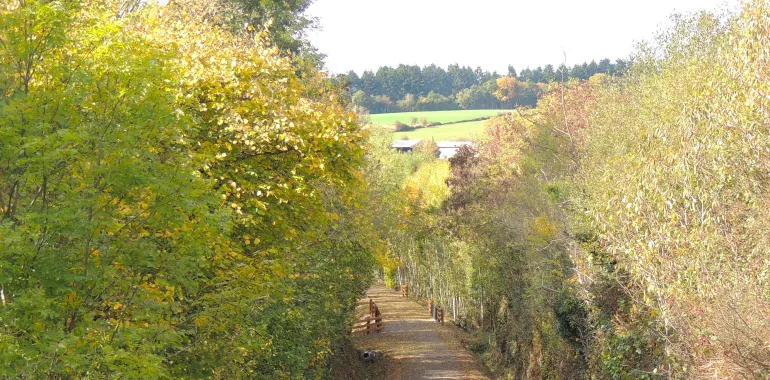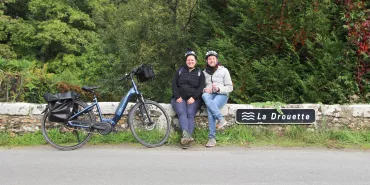 arrow_back
arrow_backPré-en-Pail-Saint-Samson / Bagnoles-de-l'Orne Veloscenic : Paris to Mont-Saint-Michel cycle route
Old railway
25,38 Km
1 h 41 min
I begin / Family
25,38 km cycling route from Pré-en-Pail-Saint-Samson to Bagnoles-de-l'Orne
Continue your cycling journey on the greenway leading to Bagnoles-de-l'Orne Normandie. This stretch serves as a link between the French counties of Orne and Mayenne, meandering through landscapes marked by rivers, forests and hedge-divided fields typical of the Parc Naturel Régional Normandie-Maine. Safe and well signposted, this stage presents no particular physical challenges. Before reaching Bagnoles-de-l’Orne, stop at the Chapelle de Notre-Dame de Lignou, with its supposedly miracle-working statue and its pilgrims’ tales and legends. Do make a detour to see the 16th- and 18th-century grounds of the Château de Couterne.
Elevation of the stage
Waytypes of the stage
Cycle path: 18,19 km By road: 7,19 km Provisional itinerary: 12,03 km
Surface of the stage
Smooth: 25,38 km
The Route
Leaving Pré-en-Pail-Saint-Samson, cross the N12 road and stick to the greenway for 18km, up to the parish of Rives d’Andaine. The surfacing, of compacted sand, is smooth and consistent. After the first 11 kilometres, it is possible to get off the greenway to ride via minor roads to the village of Neuilly-le-Vendin, with its local shops and places selling food.
At Rives d'Andaine, leave the greenway, following the signposting to reach Bagnoles via peaceful, quiet roads for six kilometres.
Tourist Office
Bagnoles-de-l'Orne : 02 33 37 85 66
SNCF bus station
Bagnoles de l'Orne
Don't miss
- Chapelle Notre-Dame de Lignou: located between Couterne and Bagnoles-de-l’Orne, you can’t miss it, its steeple rising 40m in height. Rebuilt at the start of the 20th century in Neo-Byzantine style, its interior includes some splendid mosaics.
- Château de Couterne: 2km from Bagnoles-de-l’Orne, this château’s grounds are open year-round and free of access, and are worth a detour for a pause. In summer, you can visit the exhibition room presenting objects linked to everyday life at the castle as well as its history during the 16th-century French Renaissance and Wars of Religion.


Travellers’ reviews